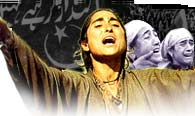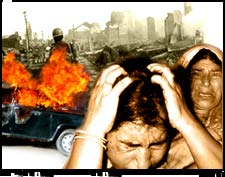

 |  |
| HOME | NEWS |SPECIALS | BLOOD IN THE SNOW | VICTIMS OF THE GUN

Chindu Sreedharan
Collateral damage: Two words or a few thousand lives?
'Collateral damage' is what the military calls the blood of innocents when they are caught in the crossfire... The sad but inevitable side effect of any armed conflict.
Like elsewhere, in Kashmir too, a vast majority did not choose to live by the gun. Yet many died by it.
Unfair.
It is perhaps the deaths of these ordinary people that have inspired and sustained a bitter conflict for 10 years. The fringe statistics of accidental casualties has moved centre stage.
Here are the stories of few that died for nothing. No patriotism. No
They were dead when he looked back
The couple started off in an auto-rickshaw. At Nowhatta in downtown, the police stopped them. There was an encounter ahead, the cops said, they should wait before proceeding. So the couple and their driver Ghulam Rasool waited.
A little later they were waved ahead. Rasool must have proceeded some 20 metres when a barrage of bullets hit his three-wheeler. Years of living under the gun had schooled him to react fast. He raced away from the area.
When he looked back his fare were dead, their bodies riddled with bullet holes.
Border Security Force personnel deployed in the area claim the Bazazs were 'caught in a crossfire.' But the locals allege that it was a drunken BSF personnel's doing.
Fifteen-year-old Mumtaz's face takes on a hunted look as she recalls the incident. Her voice trembles.
"There were three men. They broke the door open and came into our house in Kiterdagchi (a village in Baramulla district)," she says a notch above whisper. "I have never seen them before. They all had guns... no, they did not have masks. They came in when father was preparing for namaaz..."
Mumtaz's sister, 14-year-old Taira, sits with her head bowed. She can't even bear to think of the incident.
The militants didn't waste time. The father, the two uncles and aunt fell to their bullets. Taira too received one in her leg.
"They fell on me," Mumtaz says, "The militants thought I too was dead."
After the killers left, a blood-splattered Mumtaz got up. The elders were dead and her sister was bleeding. She bound Taira's leg with a cloth and waited through the night in that house of death. The police arrived only the next morning. Now the sisters stay with a family friend.
If you are wondering why the incident took place at all, don't. 'Why' is a question that has lost all relevance in Kashmir.
When they arrived, the foothill village of Wandhama, 30 km outside Srinagar, boasted four families, or a total of 23, Hindu Pandits. When they left, there was none. Alive, that is. Barring a terrified, grief-stricken Vinod Kumar Dhar, all of 14, seeing through brimming eyes the bodies of his mother, sisters and relatives, their bodies marred with bullet holes.
"When they came, they assured us they wouldn't harm the four Pandit families... one Urdu-speaking gunman asked for tea. My mother made it and served it to them herself... then time passed, and other militants began entering the other three houses, of my relatives," Dhar recalls.
Dhar was in the upper storey of the house, fighting sleep and waiting for the "guests" to leave before retiring for the night, when automatic weapons opened up.
"I heard the cries of my mother and sisters, I heard the sounds of shots from the homes of my relatives as well... I hid upstairs, scared they would search the house..."
Yet another carnage had been written into Kashmir's bloody history.
That was what met a rescue party when it reached the hilly villages of Prankote and Dakikote on April 20, 1998.
And two terrified girls.
From their account the police pieced together what had transpired. Two nights before, a group of militants had landed up. They forced their way into four homes and slaughtered the inhabitants in cold blood. Seven members of a family were charred beyond recognition.
"The village resembled a ghost area, with beheaded bodies lying scattered," a police officer was to recollect later. "It was a gruesome sight."
The bus didn't come, but a white Maruti did. From it stepped five bearded men, guns in hand. They snatched gold and money from the women. Leela didn't resist. She parted with her ornaments. Kirna, whom Leela's brother Sheesh Ram had married just two days earlier, followed suit.
Next, the assailants wanted the Hindus to stand apart. Thirty-nine men separated from the group. What followed was massacre...
Twenty-four men died that day. And two newlyweds became widows.
"The injured were crying for help," he recollects.
The inhabitants of this village in Baramulla district were gathered around the sole husking machine there when the shells came. From the very people who were supposed to protect them: the BSF.
The explosion shook the place. And took with it 11 lives.
The BSF, it was learnt later, was targeting the nearby hills where militants were believed to be hiding. "They started firing at around 1730 hours. We were busy at the machine when we heard a deafening sound. We saw a shell had hit Abdul Rashid Mir's house," recalls Bashir Ahmad.
"We asked Mir's family to come out into the compound. And we were all waiting there... praying, the women crying, when another shell landed in the compound," Ahmad adds. Mir and four family members perished in the explosion.
Police officials confirmed the shells came from the BSF camp in nearby Babapore. The BSF, however, claimed otherwise...
| |||||||||||||||||||||||||||||||||||||||